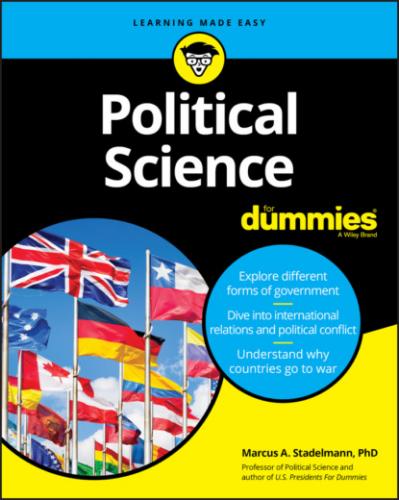Psychology: Psychology studies the way human beings think and behave within the national or international system. The political scientist can use psychology to analyze people, studying voting behavior in countries or examining the leading politicians in different countries to see how and why they make certain decisions.
All social sciences have impacted and still impact the discipline of political science. It’s impossible to be a political scientist without having knowledge of the other social sciences.
Being fragmented
The discipline of political science itself isn’t a cohesive discipline but actually is made up of various subfields, which in turn are broken down into more subfields. They are
American politics: The study of American politics involves studying American political institutions such as Congress or the presidency, as well as local or state governments. For example, the study of Texas politics falls into this category. Further, it includes the role of political parties and interest groups as well as the American electorate. Today, subfields within American politics have developed. They include public administration, which studies bureaucracies; public policy making; and the role of courts, which looks on the evolution of the constitution.
Comparative politics: Comparative politics studies other nations and cultures. It creates theories and frameworks that explain why and what happens and then identifies similar patterns and differences between political systems. Comparative Politics compares, for example, American culture to Swedish culture or looks at the voting behavior of Australians and compares it to U.S. voters. In addition, comparative politics studies various forms of governments (authoritarian, totalitarian, or democratic) and creates theories or concepts on the foundations for democracy (see Chapter 3).
International relations: International relations studies relationships between nation-states. It looks at international conflict, diplomacy, and international organizations and discusses issues such as human rights and terrorism. It also has two subfields: international political economy, which analyzes how economics and politics impact each other, and foreign policy studies, which looks at the interaction of countries with foreign nations.
Political theory: Political theory studies the great thinkers of the past and present. Most political scientists believe that the great Greek philosophers Aristotle and Plato set the foundation for political science. Political theory studies how and why people behave in a certain way politically and develops theories about the nature of people, the nature of liberty and freedom, ethics, and the role of the individual within a political system. It further includes studies on political ideologies, such as fascism, communism, and the various types of democracies.
Studying Political Power
Political science is the study of power. The discipline is enamored with the concept of power, namely how A gets B to do what A wants. Therefore, political science studies who holds power and how it’s being used.
Exercising political power
In the U.S. and other federal societies, such as Germany, states or regions also exercise political power over their population. In the U.S., the states set speed limits on their roads, and in Germany, states have the power to set tax rates.
Finally, specific people, such as teachers, can also exercise political power. Whenever teachers assign homework, they’re exercising political power over students. Student consider teachers to have authority and their use of power legitimate and therefore will do something, such as homework, they wouldn’t normally do for fun. Authority refers to a general agreement that a person has the right to make certain decisions and that these decisions should be complied with.
Different thoughts on political power
Niccolo Machiavelli (see Chapter 15) disagreed in his seminal work The Prince. He argues that power is needed to maintain the security of the state both at home and internationally. His work focuses on how to acquire power and then use it for the good of the state. Fellow political philosopher Thomas Hobbes not only agrees but also claims that political power shouldn’t be used for ethical governance but to prevent conflict both domestically and internationally.
The more modern theorists such as John Locke and Jean-Jacques Rousseau (see Chapter 15) argue differently. They believe that the people should exercise political power in a nation-state and need to be able to hold their leader accountable. For Locke, whose work became the foundation for the American political system, a contract exists between leaders and citizens on how to exercise political power. If leaders violate the contract, the people can remove them from their positions.
More recent thinkers such as John Rawls (see Chapter 19) have added the components of social justice and economic equality to their theories.
Views on who holds the power
One of the ongoing questions in political science is how can the researcher determine who holds power in a society. Over time, six different explanations were developed.
Bureaucratic theory: Bureaucratic theory assumes that bureaucracies in countries hold power and make the most important decisions for society. It’s therefore not politicians nor other leaders but top-level bureaucrats who run a country. They work for the good of the country, not to amass wealth, and their policies are based on what’s best for a country. When studying France or Japan, two countries with powerful bureaucracies, bureaucratic theory can be used to study political power.
Pluralism: Pluralism, as developed by James Madison (see Figure 1-2) in Federalist Paper Number 10, believes interest groups will be created as societies become more economically
